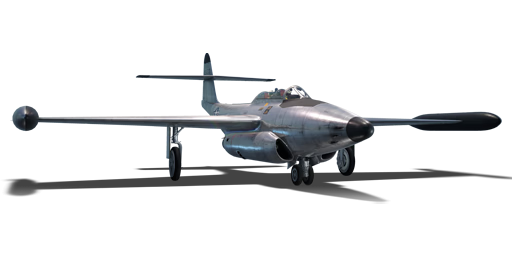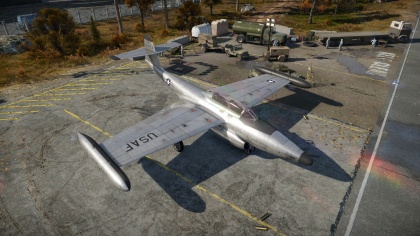Difference between revisions of "F-89B"
kksmith244 (talk | contribs) (added →Survivability and armour) (Tag: Visual edit) |
Inceptor57 (talk | contribs) (→Survivability and armour: Edits) |
||
| Line 140: | Line 140: | ||
=== Survivability and armour === | === Survivability and armour === | ||
| − | + | <!--Examine the survivability of the aircraft. Note how vulnerable the structure is and how secure the pilot is, whether the fuel tanks are armoured, etc. Describe the armour, if there is any, and also mention the vulnerability of other critical aircraft systems.--> | |
| − | + | The F-89B has two 12.7 mm steel armor plates in the nose and a 60 mm bulletproof windshield. The wing tips will break past the aileron at 920+ km/h (depending on altitude) and will count as a vehicle loss. However, the plane can limp back to base if the pilot: maintain speed/don't turn sharp to avoid a spin, approach the airfield low and straight on, open the air brake to help balance the broken wing, roll the intact wing '''down,''' lower the gear at < 300 kph then roll back level onto the runway. There the pilot can repair his plane and get back in the fight! | |
== Armaments == | == Armaments == | ||
Revision as of 17:15, 10 December 2019
Contents
| This page is about the American jet fighter F-89B. For other version, see F-89D. |
Description
The F-89B is a premium rank V American jet fighter
with a battle rating of 6.7 (AB), 7.0 (RB), and 7.3 (SB). It was introduced in Update 1.91 "Night Vision".
The F-89B Scorpion was designed and built to be an all-weather interceptor intended to neutralize any potential invading Soviet bomber force. The USAAF was intent in replacing the P-61 Black Widow with another night fighter, one specifically which would fly faster (minimum 530 mph/850 kph) almost assuredly requiring the usage of jets, six sixty-calibre machine guns or 20 mm autocannons and armed with internally stored aerial rockets. To round out the aircraft for ground attack if needed, it would also need to accommodate 1,000 lb bombs and eight larger rocket types externally. Initial wind tunnel testing of the fighter determined that the proposed swept-wings were insufficient at slow speeds and were changed out with straight wings. Though causing a loss of high-end performance, increased stability at low speeds was necessary.
Other changes to the horizontal stabilizer also increased the effectiveness of the elevators and rudder. Concerns about the fuel tanks situated right over the engines were nullified when it was determined that efforts made by Northrop to protect them were considered sufficient, anything else would have required a complete redesign of the aircraft.
Other key features of the Scorpion was the usage of decelerons or clamshell-style split ailerons which work as a standard aileron, however, can open up as a dive brake or be utilized as a takeoff/landing flap. Last-minute changes by the Air Force required upgrading the engines and outfitting an afterburner, adding a radar system, fire control system, permanent wingtip fuel tanks, reconfigured nose guns and easy access to lower the entire engine to make for easier maintenance.
The F-89B was an upgraded version of the F-89A, primarily featuring only upgraded avionics. Armament remained standard with six nose-mounted 20 mm cannons. As an interceptor, the F-89B was well suited to have the six nose-mounted cannons which did not require the pilot to have to worry about convergence, especially when flying at higher speeds. The tightly packed cannons concentrated the 20 mm rounds in a tight pattern and when fired in bursts can unleash devastation on both enemy bomber and fighter aircraft, especially suited for head-ons or even strafing runs aimed at the wings or engine sections of the aircraft. While there are only 200 rounds per gun (1,200 total), they are not meant for the pilot to just hold the trigger and spray but instead require a bit of trigger control and fire in short bursts as typically it does not take much to disable or destroy another aircraft.
The F-89B is a fairly large aircraft and can be an easy target for other aircraft, so speed is key to maintain manoeuvrability and make it difficult for an enemy fighter to get a positive gun solution on the Scorpion. Boom & Zoom tactics will be the best bet for this fighter as while it is a stable flyer when going slow, it, however, will be an easy target and slow manoeuvring aircraft without the advantage of speed.
General info
Flight performance
Describe how the aircraft behaves in the air. Speed, manoeuvrability, acceleration and allowable loads - these are the most important characteristics of the vehicle.
| Characteristics | |||||||
|---|---|---|---|---|---|---|---|
| Stock | |||||||
| Max Speed (km/h at sea level) |
Max altitude (meters) |
Turn time (seconds) |
Rate of climb (meters/second) |
Take-off run (meters) | |||
| AB | RB | AB | RB | AB | RB | ||
| ???? | 961 | 15240 | ??.? | ??.? | ??.? | ??.? | 611 |
| Upgraded | |||||||
| Max Speed (km/h at ??,??? m) |
Max altitude (meters) | Turn time (seconds) | Rate of climb (meters/second) |
Take-off run (meters) | |||
| AB | RB | AB | RB | AB | RB | ||
| ???? | ???? | 15240 | ??.? | ??.? | ??.? | ??.? | ???? |
Details
| Features | ||||
|---|---|---|---|---|
| Combat flap | Take-off flap | Landing flap | Air brakes | Arrestor gear |
| ✓ | ✓ | ✓ | ✓ | X |
| Limits | ||||
|---|---|---|---|---|
| Wing-break speed (km/h) |
Gear limit (km/h) |
Combat flap (km/h) |
Max Static G | |
| + | - | |||
| 920 | 379 | 570 | ~?? | ~4 |
| Optimal velocities | |||
|---|---|---|---|
| Ailerons (km/h) |
Rudder (km/h) |
Elevators (km/h) |
Radiator (km/h) |
| < ??? | < ??? | < ??? | > ??? |
| Compressor (RB/SB) | ||
|---|---|---|
| Setting 1 | ||
| Optimal altitude | 100% Engine power | WEP Engine power |
| 0 m | ???? kgf | ???? kgf |
Survivability and armour
The F-89B has two 12.7 mm steel armor plates in the nose and a 60 mm bulletproof windshield. The wing tips will break past the aileron at 920+ km/h (depending on altitude) and will count as a vehicle loss. However, the plane can limp back to base if the pilot: maintain speed/don't turn sharp to avoid a spin, approach the airfield low and straight on, open the air brake to help balance the broken wing, roll the intact wing down, lower the gear at < 300 kph then roll back level onto the runway. There the pilot can repair his plane and get back in the fight!
Armaments
Offensive armament
The F-89B is armed with 6x M24A1 20mm cannon in the nose. Although each gun only holds 200 rounds (1,200 total), a well-aimed burst with the air targets belt will easily destroy any target or at least set it on fire.
Usage in battles
Describe the tactics of playing in an aircraft, the features of using vehicles in a team and advice on tactics. Refrain from creating a "guide" - do not impose a single point of view, but instead, give the reader food for thought. Examine the most dangerous enemies and give recommendations on fighting them. If necessary, note the specifics of the game in different modes (AB, RB, SB).
Pros and cons
Pros:
- Six 20 mm cannons clustered in the nose, massive burst mass
- Excellent for head-on attacks
- Quick accelerator with afterburner
- Dual-engine, can fly with one (though, head back to base!)
- Targeting radar equipped
Cons:
- Large target wing-surface
- Heavy wing-tips, losing one throws the aircraft off balance
- Autocannons only, no rocket, missile or bomb options
- Not as nimble as single-engine MiGs
- Limited ammo with 200 RPG, must use trigger control
History
Almost immediately after WWII, the Nothrop Corporation began developing an experimental jet fighter-interceptor to meet the new requirements for that class of aircraft. The American interceptor’s primary targets were supposed to be Soviet bombers, so the projected model’s flight characteristics and armament had to meet this objective. At first the two-seater twin-engine jet was developed to have a rather interesting four gun turret. This turret was to be mounted on the aircraft’s nose and could fire on targets either automatically or manually along a vertical plane either forward, up, down or, in some cases, backward. However, when the experimental model of the aircraft was ready, the turret still hadn’t undergone testing yet, so the military decided to install traditional static frontal guns on it, as well as HVARs on the wing pylons. It was with this loadout that the Scorpion F-89A and F-89B went into service. The armament was switched exclusively to rockets somewhat later. To make the change to rockets, the designers implemented an interesting solution: Mighty Mouse unguided rockets were installed on the front of the wing-mounted fuel tanks in such a way that the rocket and fuel sections of this part of the design were separated by a fireproof barrier. This also made it possible to install heavier, more destructive HVARs under the wing. The F-89D or “rocket” version of the Scorpion went on to become the most widespread version of the aircraft in the US air force – 682 of them were manufactured.
- From Devblog
Media
Excellent additions to the article would be video guides, screenshots from the game, and photos.
See also
- F-89D - Rocket-armed variant of the fighter.
External links
| USA jet aircraft | |
|---|---|
| Fighters | |
| F9F | F9F-2 · F9F-5 · F9F-8 |
| F-80 | F-80A-5 · F-80C-10 |
| F-84 | F-84B-26 · F-84F · F-84G-21-RE |
| F-86 | F-86A-5 · F-86F-25 · F-86F-2 · F-86F-35 |
| F-89 | F-89B · F-89D |
| F-100 | F-100D |
| F-104 | F-104A · F-104C |
| F-4 | F-4C Phantom II · F-4E Phantom II · F-4J Phantom II · F-4S Phantom II |
| F-5 | F-5A · F-5C · F-5E · F-20A |
| F-8 | F8U-2 · F-8E |
| F-14 | F-14A Early · ▄F-14A IRIAF · F-14B |
| F-15 | F-15A · F-15C MSIP II · F-15E |
| F-16 | F-16A · F-16A ADF · F-16C |
| Other | P-59A · F2H-2 · F3D-1 · F3H-2 · F4D-1 · F11F-1 |
| Strike Aircraft | |
| FJ-4 | FJ-4B · FJ-4B VMF-232 |
| A-4 | A-4B · A-4E Early |
| A-7 | A-7D · A-7E · A-7K |
| AV-8 | AV-8A · AV-8C · AV-8B Plus · AV-8B (NA) |
| A-10 | A-10A · A-10A Late · A-10C |
| F-111 | F-111A · F-111F |
| Other | A-6E TRAM · F-105D · F-117 |
| Bombers | |
| B-57 | B-57A · B-57B |





